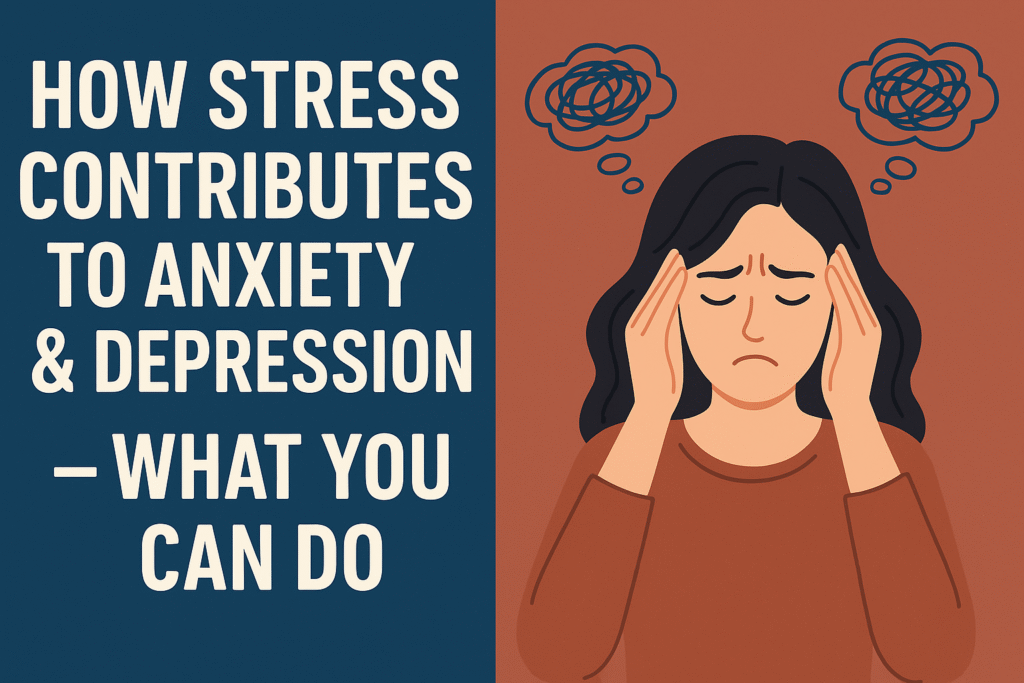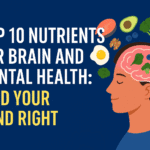
Stress has become the constant background music of modern life – often loud , sometimes quiet , but always present. And while a little stress can push us to perform better, chronic stress is a silent force that chips away at our emotional well-being. Over time, it can spiral into something more dangerous: anxiety and depression.
In this article, we will understand the stress and anxiety connection, how stress affects mental health, and offer natural ways to cope, so you can regain peace, clarity, and control over your life.
The Science Behind the Stress-Anxiety Link
So, how does stress lead to anxiety and depression?
When you’re stressed, your brain floods your system with cortisol – the “flight or fight” hormone, often termed as adrenaline rush. While this helps in short bursts , constant stress keeps the brain in high-alert mode, exhausting your nervous system.
This overstimulation gradually affects:
1 . Mood regulating chemicals like serotonin and dopamine
2 . Cognitive processes such as memory, concentration, and emotional control
3 . Sleep cycles , which are essential for mental recovery
The result? You start to feel on edge , emotionally drained, or helpless – classic signs of anxiety and depression.
Signs You Might Be Experiencing Chronic Stress and Depression
Stress isn’t always loud. Sometimes, it may signal through small symptoms that build up over time. Watch out for these signs:
- Persistent worry, dread, or panic attacks
- Difficulty sleeping or staying asleep
- Feeling overwhelmed, irritable, or emotionally numb
- Physical fatigue, headaches, or muscle tension
- Loss of interest in daily activities
- Negative self-talk and low motivation
Can chronic stress cause long-term mental health issues?
Absolutely, if left unchecked, stress can change brain structure and function, making you more vulnerable to anxiety disorders and major depressive episodes.
Why Mental Resilience Matters
Think of mental resilience as your brain’s immune system – it helps you bounce back after emotional setbacks. It helps in strengthening your self-belief, confidence and help you overcome any major setbacks that life may throw at you.
But how to improve mental resilience against stress?
- Emotional awareness: Being mindful of your feelings can stop spirals before they deepen.
- Healthy boundaries: Knowing when to say no helps conserve emotional energy.
- Support systems: Talking to friends, family, or a therapist can act as an emotional anchor.
Natural Remedies for Reducing Stress and Anxiety
Medication can help in some cases, but many people seek natural remedies for reducing stress and anxiety to avoid side effects and promote long-term healing:
1. Mindful Breathing and Meditation
Even five minutes a day can slow your heart rate, lower cortisol, and promote clarity. This will help you feel at peace and focus back .
2. Herbal Support
Adaptogens like ashwagandha, holy basil, and chamomile tea have calming properties that support your nervous system. Moderate consumption will prove effective.
3. Daily Movement
Exercise doesn’t have to be intense. A brisk walk, yoga, or dancing in your room releases endorphins and helps reduce anxiety. Take out time and be consistent.
4. Balanced Diet
Foods rich in omega-3s, magnesium, and antioxidants help regulate mood and brain function. Stress may result in eating disorders or even excess eating more than necessary, hence, being mindful and aware of our habits during stress is important.
5. Limit Stimulants
Cutting back on caffeine, alcohol, and processed sugar can stabilize your mood and energy levels. Cut off negative people, unfollow , delete or remove yourself from places and applications that leave a negative impact on your mental health. Instead go for walks, connect with nature and have digital detox.
Best Stress Management Techniques to Prevent Anxiety
Looking for sustainable ways to cope? Here are top coping strategies for stress and anxiety backed by research and real-life success:
Journaling
Writing down your thoughts helps declutter the mind and process emotions. Be as open and expressive as possible. Your diary or journal is your safe space. The opposite of depression is expression. So express yourself. It can also be through creativity, fictional story writing or simply by talking.
Digital Detox
Taking breaks from screens – especially social media – helps reduce comparison-based anxiety. Often the anxiety we feel can be a result of fear of missing out, feeling like you are not enough or simply because you are different from people. It’s best to stay away and embrace your uniqueness.
Nature Therapy
Spending time outdoors, whether in a park or garden, lowers cortisol and lifts mood. Nature is the Alchemist healer, not only it gives you peace but also gives you reasons to be happy. Through the beauty of nature. Just as trees let go of leaves , try leaving out those unnecessary stuff and baggage along with those thoughts that are birthed due to others’ impact. You are one with nature.
Sleep Hygiene
Consistent sleep schedules and screen-free nights help your brain rest and recharge. Make a resolution and screen hour, consistently follow it. You can live without your digital tools constantly being in your hands. You can also have a plan wherein you are not allowed to use any form of technology for a whole day.
Therapy or Counseling
Cognitive Behavioral Therapy (CBT) is especially effective in changing negative thinking patterns triggered by chronic stress. You can seek professional help or simply do this – whenever you feel anxious and lonely, your mind racing with negative thoughts, write those down on a paper . Remember they are just your thoughts coming from an unhealed part of you. Be kind and do not believe everything you think. Write down the opposite of those negative thoughts and reaffirm them. You can also reach out a close one and confide where you feel safe.
Stress doesn’t make you weak , it makes you human. But ignoring it can lead you down the path of anxiety and depression. Knowing how stress affects mental health allows you to take timely action. If you’ve been asking yourself, “Can chronic stress cause long-term mental health issues?” , the answer is yes, but it doesn’t have to. With awareness, support, and consistent habits, you can rewrite that story.
Your mind deserves the same care and compassion you offer to others. Start small, breathe deeply, and remember: you’re not alone, and you’re not powerless. To Know more, click here

